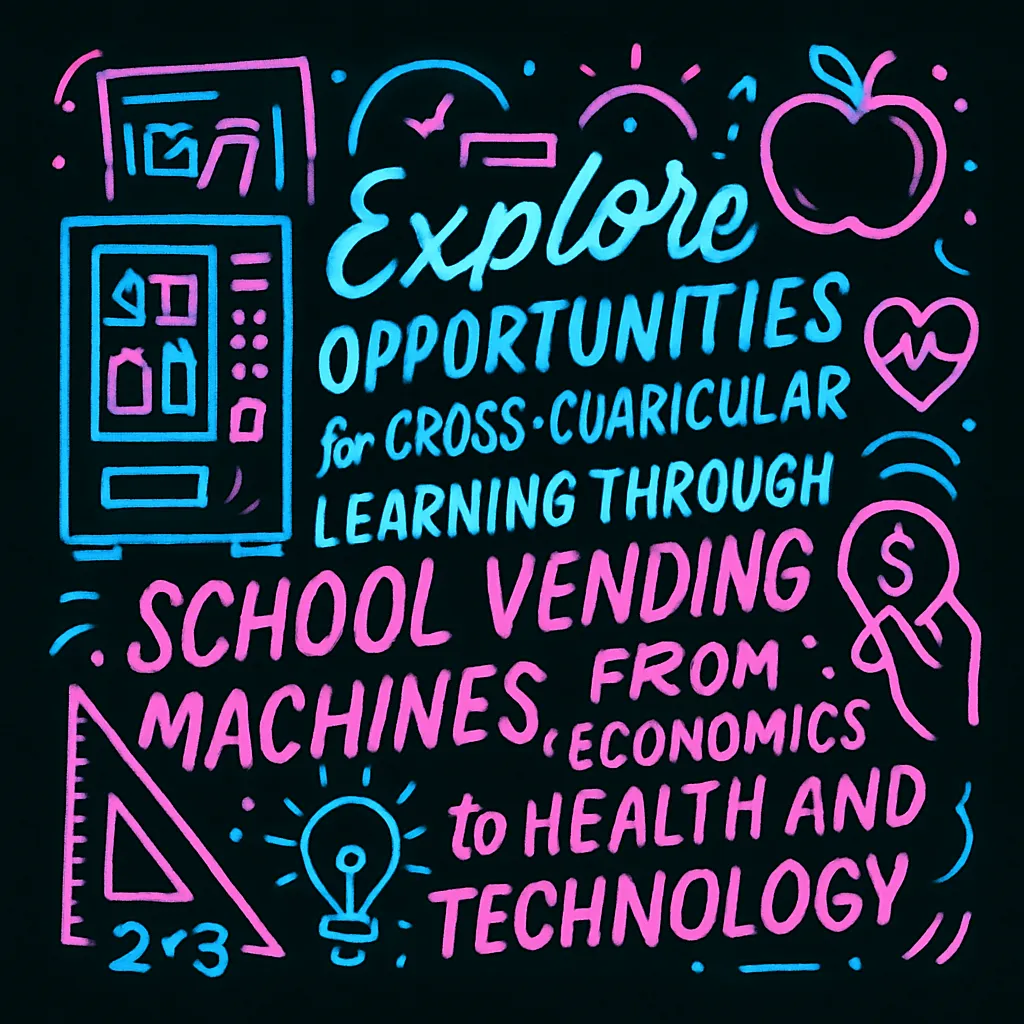Cross-Curricular Learning with School Vending
Explore opportunities for cross-curricular learning through school vending machines, from math and economics to health and technology.
Back to Vending for Schools ResourcesExplore opportunities for cross-curricular learning through school vending machines, from math and economics to health and technology.
Back to Vending for Schools ResourcesSchool vending machines offer a unique platform for practical, hands-on learning, integrating vital lessons from various subjects into daily school life.
![]() Teach economic principles through real-world sales and budgeting.
Teach economic principles through real-world sales and budgeting.
![]() Promote healthy lifestyle choices by curating nutritious product selections.
Promote healthy lifestyle choices by curating nutritious product selections.
![]() Develop analytical skills by tracking inventory and sales data.
Develop analytical skills by tracking inventory and sales data.

In today's innovative educational landscape, every corner of a school building can become a classroom. School vending machines, often seen merely as sources of quick refreshments, hold untapped potential for dynamic cross-curricular learning. By strategically integrating vending operations into lesson plans, educators can provide students with practical, real-world experiences that bridge the gap between theoretical knowledge and applied skills across various subjects.
Imagine students analyzing consumer demand for different snacks, calculating profit margins, managing inventory, and even experimenting with pricing strategies to optimize sales. These activities provide a hands-on introduction to economic principles, market forces, and entrepreneurial thinking. They can learn about operating a small business, understanding supply chains, and the importance of financial literacy—all components critical for future success.
Numbers come alive when students are responsible for tracking sales data, totaling revenue, predicting future demand, and performing cost-benefit analyses on new product introductions. The daily operations of a vending machine offer endless opportunities for applying arithmetic, algebra, and even statistics. This direct engagement fosters a deeper understanding and appreciation for mathematical concepts often perceived as abstract. For schools focusing on healthy habits, incorporating healthy vending machines for schools further elevates the learning experience.
Using vending machines as a tool for health education is perhaps one of its most impactful cross-curricular applications. Students can research nutritional content, identify healthier options compliant with school guidelines, and even campaign for the inclusion of specific nutritious items. This can be directly linked to discussions about balanced diets, public health, and responsible consumer choices, empowering students to make informed decisions about their well-being. Schools can adhere to strict healthy snack policies to ensure appropriate offerings.
Modern vending machines are equipped with advanced technology, presenting opportunities for students to explore digital payment systems, inventory management software, and remote monitoring capabilities. They can troubleshoot minor technical issues, understand user interface design, and even suggest improvements. Such engagement cultivates essential technology literacy and problem-solving skills, preparing them for an increasingly digital world.
Cross-curricular learning in school vending involves using the vending machines as a practical tool to teach subjects like math, economics, nutrition, technology, and marketing, integrating real-world concepts into the curriculum.
Students can calculate profits, analyze sales data, track inventory, determine pricing strategies, handle cash transactions, and compute change, all applying fundamental math skills.
They can explore supply and demand, cost analysis, revenue generation, budgeting, market research, and the impact of pricing on sales, providing a hands-on introduction to economics.
Students can research and select healthy snack options, compare nutritional labels, understand dietary guidelines, and promote balanced eating habits among their peers, aligning with wellness programs.
Yes, students can learn about cashless payment systems, inventory management software, machine maintenance, data analytics for sales trends, and even basic troubleshooting of digital displays.
Students can design promotional campaigns, conduct surveys to understand student preferences, create appealing product displays, and develop business plans for optimizing machine performance, fostering entrepreneurial thinking.
Science lessons can involve exploring the physics of vending machine mechanisms, the chemistry of food preservation, or the biological impact of different nutrients on the human body.
Students can analyze consumer behavior, debate ethical considerations in food choices, understand local regulations for school nutrition, or discuss the socioeconomic impact of food access.
It provides practical, real-world application of academic concepts, enhances problem-solving skills, encourages teamwork, promotes responsibility, and prepares students for future careers.
Schools should partner with reputable vending providers who offer compliant product selections and integrate the vending program directly into lesson plans and extracurricular activities with clear learning objectives.